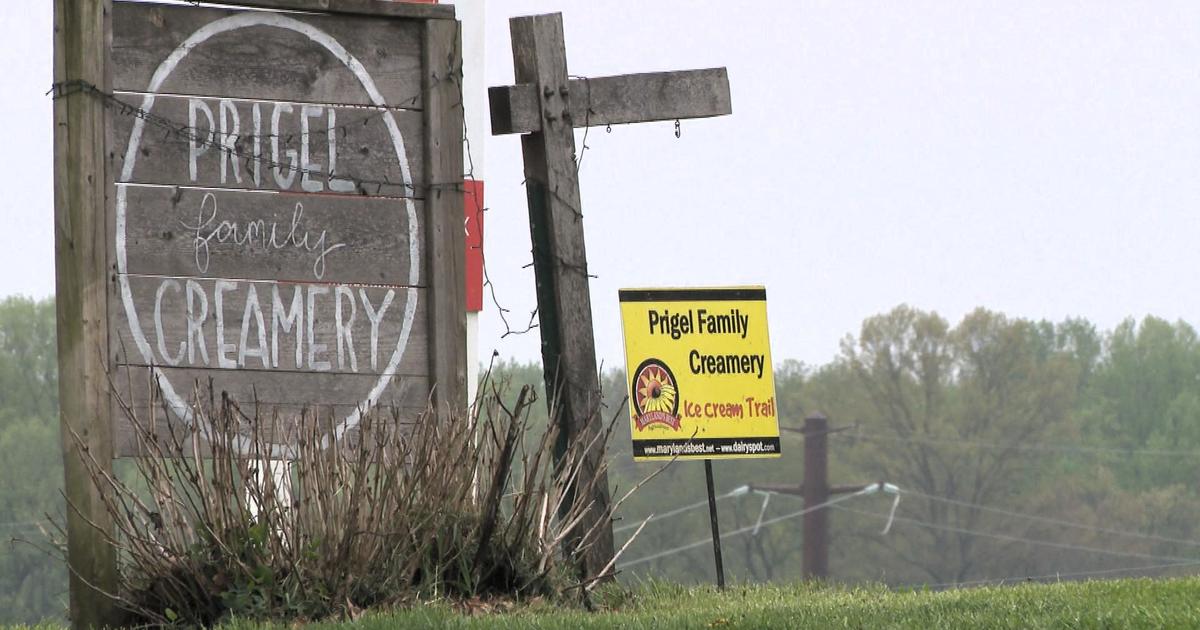648,000 Eggs A Day: A Look At Sauder's Farm In Md.
KELCIE PEGHER
The Carroll County Times
HAMPSTEAD, Md. (AP) -- It takes three to four minutes for an egg to go through the process of washing, rinsing and sanitizing before it is packed into a carton of a dozen eggs and shipped off from Sauder's Eggs.
While business is busier during the spring, said Evan Fogarty, the operating manager of Sauder's Eggs, it's nothing like previous years. The National Retail Federation also estimates spending will remain flat for the Easter season, compared to 2012.
Almost 87 percent of those celebrating Easter will spend an average of $45.26 on a holiday meal. While eggs are a fraction of that cost, it includes eggs for dying and cooking. Passover also helps spring egg sales, Fogarty said, because a hard-boiled egg is traditionally among the food items on a Seder plate.
"I think the baking season -- probably Thanksgiving and Christmas through the New Year has the highest demand (for eggs)," Fogarty said.
According to the Department of Agriculture, 6.9 billion eggs were produced in December. The number dropped slightly, then picked back up to 6.8 billion in March, and fell to 6.5 billion in April 2012. Both Passover and Easter were in early April last year.
While a total of 648,000 eggs per day are processed at the Hampstead facility, the chickens are out of sight. That's because Sauder's works with 60 small farms in the Northeast that have chickens lay the eggs.
The company is a fourth-generation family-owned egg business. Each Sauder's Eggs plant processes eggs from small egg farms in Maryland, Pennsylvania and Ohio, where its plants are located.
Sunnyside Farms in Westminster is among them. The farm is one of nine in Maryland that have flocks used for commercial production, said Deanna Baldwin, the program manager for food quality assurance at the Maryland Department of Agriculture.
There are just around 400 "small flocks" that are registered with the Department of Agriculture, Baldwin said. A small flock can have up to 3,000 chickens, but 95 percent of those farms will have less than 100, she said.
"When you put all 400 of them together, it amounts to about 2 percent of the number of eggs that the state of Maryland consumers would eat," she said.
This makes Maryland an egg deficient state, she said. The American Egg Consumption looks at the per capital consumption rate for the year, she said. If you multiply the population of Maryland with the per capita consumption rate, it gives roughly the number of eggs Maryland would need -- roughly 75 million dozen.
Maryland produces roughly 70 million dozen eggs, Baldwin said.
It doesn't mean Maryland is in danger of any kind of egg-drought, though. Neighboring states like Pennsylvania, which produce a large number of eggs, are able to help make up for the loss, Baldwin said. It mostly depends on population, she said. For example, while Iowa is the number one egg producing state in the country, Maryland has a much bigger population than Iowa.
"An egg farm takes a lot of land. You can't plop a large egg farm in the middle of Annapolis, for example," she said.
Sauder's Eggs prepares for the busy seasons in spring and winter by arranging flock placements at the right time -- meaning the right time of year when chickens are laying the most eggs, Fogarty said. Sometimes the company will reach out and get eggs from wholesalers, but it prefers to stick with local companies, Fogarty said.
Each batch of Sauder's Eggs has a tracking number on it that a person can look up online and see which farm the egg came from, and a little bit about that farm.
Sauder's will go to a farm like Sunnyside once or twice a day for eggs to be processed, Fogarty said. By the evening, the eggs are being shipped to local and national grocery stores in the area.
That includes everything from the small grocery stores like Miller's Food Market in Manchester to Safeway.
The eggs are washed and rinsed by a machine that automatically plucks out any eggs that are broken. Any eggs with visible cracks are pulled by the candler, who looks at the eggs in a line underneath a warm light. The eggs are then put through an ultrasound -- Fogarty said each egg is scanned 24 times by a series of cameras before it goes to the box. The eggs are weighed and segregated by size, where they're then placed by a machine into the carton.
While the company processes a large amount of eggs each day, the Hampstead branch has just 35 employees who do anything from candling to packing the cartons into boxes to packing the trucks for each grocery store.
"With modern technology, you can get eggs from the farm to the stores, and be as fresh as 24 to 48 hours," he said.
(Copyright 2013 by The Associated Press. All Rights Reserved.)



